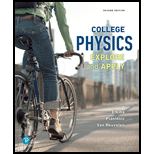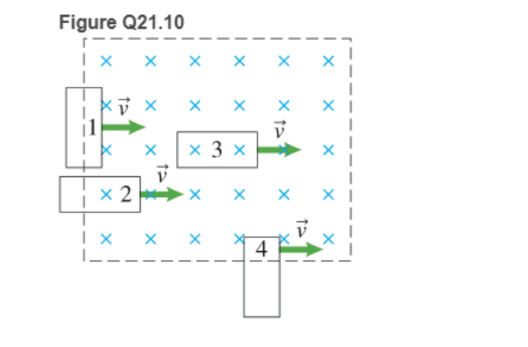
Four identical loops move at the same velocity toward the right in a uniform magnetic field inside the dashed lines, as shown in Figure Q21.10. Which choice below best represents the ranking of the magnitudes (largest to smallest) of the induced currents in the loops at the snapshot shown in the figure?

a.
b.
c.
d.
e.
Want to see the full answer?
Check out a sample textbook solution
Chapter 21 Solutions
College Physics
Additional Science Textbook Solutions
Brock Biology of Microorganisms (15th Edition)
Genetic Analysis: An Integrated Approach (3rd Edition)
Microbiology: An Introduction
Chemistry: Structure and Properties (2nd Edition)
Microbiology: An Introduction
Physics for Scientists and Engineers: A Strategic Approach, Vol. 1 (Chs 1-21) (4th Edition)
- A circular coil with 200 turns Las a radius of 2.0 cm. (a) What current through tire coil results in a magnetic dipole moment of 3.0 Am2? (b) What is the maximum torque that the coil will experience in a uniform field of strength 5.0102 ? (c) If tire angle between and B is 45°, what is the magnitude of tire torque on the coil? (d) What is the magnetic potential energy of coil for this orientation?arrow_forward(a) By how many percent is the torque of a motor decreased if its permanent magnets lose 5.0% of their strength? (b) How many percent would the current need to be increased to return the torque to original values?arrow_forward(a) What is me maximum torque on a 150Turn square loop of wire 18.0 cm on a side that carries a 50.0-A current in a 1.60T field? (b) What is the torque when (is 10.9°?arrow_forward
- (a) By how many percent is the torque of a motor decreased if its permanent magnets lose 5.0% of their strength? (b) How many percent would the current need to be increased to return the torque to original values?arrow_forwardTwo long, straight wires are parallel and 10 cm apart. One cans a current of 2.0 A, the other a current of 5.0 A. (a) If the two currents flow in opposite directions, what is the magnitude and direction of the force pet unit length of one wire on the other? (b) What is the magnitude and direction of the force per unit length if the currents flow in the same direction?arrow_forwardConsider the system pictured in Figure P28.26. A 15.0-cm horizontal wire of mass 15.0 g is placed between two thin, vertical conductors, and a uniform magnetic field acts perpendicular to the page. The wire is free to move vertically without friction on the two vertical conductors. When a 5.00-A current is directed as shown in the figure, the horizontal wire moves upward at constant velocity in the presence of gravity. (a) What forces act on the horizontal wire, and (b) under what condition is the wire able to move upward at constant velocity? (c) Find the magnitude and direction of the minimum magnetic Field required to move the wire at constant speed. (d) What happens if the magnetic field exceeds this minimum value? Figure P28.26arrow_forward
- A conductor consists of a circular loop of radius K and two long, straight sections as shown in Figure P50.7. The wire lies in the plane of the paper and carries a current I. (a) What is the direction of the magnetic field at the center of the loop? (b) Find an expression for the magnitude of the magnetic field at the center of the loop.arrow_forwardA toroid with an inner radius of 20 cm and an outer radius of 22 cm is tightly wound with one layer of wire that has a diameter of 0.25 mm. (a) How many turns are there on the toroid? (b) If the current through the toroid windings is 2.0 A, what is the strength of the magnetic field at the center of the toroid?arrow_forwardA circuit consists of a conducting movable bar and a lightbulb connected to two conducting rails as shown in Figure OQ31.10. An external magnetic field is directed perpendicular to the plane of the circuit. Which of the following actions will make the bulb light up? More than one statement may be correct, (a) The bar is moved to the left, (b) The bar is moved to the right. (c) The magnitude of the magnetic field is increased. (d) The magnitude of the magnetic field is decreased. (e) The bar is lifted off the rails.arrow_forward
- Review. In Figure P30.42, a uniform magnetic field decreases at a constant rate dB/dt = K, where K is a positive constant. A circular loop of wire of radius a containing a resistance R and a capacitance C is placed with its plane normal to the field. (a) Find the charge Q on the capacitor when it is fully charged. (b) Which plate, upper or lower, is at the higher potential? (c) Discuss the force that causes the separation of charges. Figure P30.42arrow_forwardUnreasonable results Frustrated by the small Hall voltage obtained in blood flow measurements, a medical physicist decides to increase the applied magnetic field strength to get a 0.500-V output for blood moving at 30.0 cm/s in a 1.50-cm-diameter vessel. (a) What magnetic field strength is needed? (b) What is unreasonable about this result? (C) Which premise is responsible?arrow_forwardA proton moving horizontally enters a region where a uniform magnetic field is directed perpendicular to the proton's velocity as shown in Figure OQ29.4. After the proton enters the field, does it (a) deflect downward, with its speed remaining constant; (b) deflect upward, moving in a semicircular path with constant speed, and exit the field moving to the left; (c) continue to move in the horizontal direction with constant velocity; (d) move in a circular orbit and become trapped by the field; or (e) deflect out of the plane of the paper?arrow_forward
 College PhysicsPhysicsISBN:9781285737027Author:Raymond A. Serway, Chris VuillePublisher:Cengage Learning
College PhysicsPhysicsISBN:9781285737027Author:Raymond A. Serway, Chris VuillePublisher:Cengage Learning Physics for Scientists and Engineers: Foundations...PhysicsISBN:9781133939146Author:Katz, Debora M.Publisher:Cengage Learning
Physics for Scientists and Engineers: Foundations...PhysicsISBN:9781133939146Author:Katz, Debora M.Publisher:Cengage Learning Principles of Physics: A Calculus-Based TextPhysicsISBN:9781133104261Author:Raymond A. Serway, John W. JewettPublisher:Cengage Learning
Principles of Physics: A Calculus-Based TextPhysicsISBN:9781133104261Author:Raymond A. Serway, John W. JewettPublisher:Cengage Learning
 Physics for Scientists and Engineers, Technology ...PhysicsISBN:9781305116399Author:Raymond A. Serway, John W. JewettPublisher:Cengage Learning
Physics for Scientists and Engineers, Technology ...PhysicsISBN:9781305116399Author:Raymond A. Serway, John W. JewettPublisher:Cengage Learning Physics for Scientists and EngineersPhysicsISBN:9781337553278Author:Raymond A. Serway, John W. JewettPublisher:Cengage Learning
Physics for Scientists and EngineersPhysicsISBN:9781337553278Author:Raymond A. Serway, John W. JewettPublisher:Cengage Learning





